We'll be taking trips down very specific British lanes, mostly by way of the NYC and Jamaican sides of my brain. The core thing to remember is that cross-cultural appreciation boils down to upbringing, exposure, and language.
Strap in.
Let’s start at ground zero by defining the word “Culture.”
Culture is broad and all-encompassing, though people try to narrowly define it based on birth location. When we (simply) ascribe culture to birthplace, it becomes a throwaway term. Something binary. Culture is therefore a verb, not a noun (i.e., it’s not only the city, state, and country on your birth certificate). That is certainly one important component, to be fair.
Here is a list of things that I’m sure won’t be fully exhaustive, outlining attributes that affirm why I believe culture is a verb:
Food
Music
Attire
Mannerisms (around everything, down to the mechanics of how you eat your food)
Traditions
Morals
Customs
Beliefs on transportation (ask someone in NYC viable ways of getting around vs. someone from the Bajo (“sea nomad”) people of Southeast Sulawesi, Indonesia)
Practices, and most importantly, how and why behind those practices
Language
The last one, language, is by far my favorite attribute to examine, and one that will be a core focus of this piece. Because even in the same country (i.e., what we presume to be the same culture), the variations in tongue are amazing. Linguists’ and anthropologists’ sugar high.
Net-net, you have to actually do the things above to appropriately qualify the extent to which you are of a culture. Not all at once, obviously. Why? You have people who support the location argument who want absolutely nothing to do with the other aspects of that culture. The place of birth is their unhappy consequence, if you will, an event they would've altered if it were their choice. Many, in fact, make it a point to shape their persona around embracing all things opposite to their culture, even going as far as talking down about the heritage they were born into. Examples abound, but that’s not the focus of this piece. Just setting the tone so that what follows makes sense.
If you want a superb analysis of culture, tribalism, and how those elements relate across seemingly different groups of people, I recommend checking out Gillian Tett’s Anthro-Vision: A New Way To See In Business And Life.
Hope I get to review this at some point. In the meantime, a preview:
An investment banking conference is just like a Tajik wedding, I thought. A group of people were using rituals and symbols to create and reinforce their social ties and worldview.
…laughter inadvertently defines social groups since you have to have a shared cultural base to “get” a joke. Insiders know when to laugh, even instinctively…
And on that last bit around laughter, language is the raw material, the fundamental “stuff” that allows laughter to have a platform.
A little disclaimer before we jump in.
Most of my focus in this piece will center on the Black-British experience since that’s the one I’m more intimately familiar with, and connected to, via friends in London and family in Croydon. A painful Uber ride made me realize that Croydon is FRIGGIN FAR from the center of London, my goodness. Anywho. Even with this focus, my scope will still be narrow(er) because, ultimately, I’m an outsider to this culture despite whatever proximity and exposure I’ve had. Lastly, for reasons unsurprising if you’ve touched any of my other pieces, the Caribbean ilk will get a bit more play than Afro-Black-British culture (even though the two intersect in the Black British culture venn diagram, naturally).
For a beautifully-written and appropriately-told dive into Black British Culture, which my brain finds hilarious that this could be acronymed to BBC, check out this post –

What’s all the fuss above got to do with the Brits and me?
Language. You should’ve seen the confusion on my face the first time I heard a British person, who I could be reasonably assured had no Caribbean (much less Jamaican) background, utter the words – “wa gwan.” Not in a gimmicky way. Not even in a jeering way. It was a pure and mundane greeting/question. I couldn’t tell you when I first heard this, but I’ll shoot from the hip and guess. Let’s go with 2014 (2015, latest).
I’d always shrug off when family in the UK said “wa gwan” because that could’ve been uttered by a Jamaican diasporan from Canada, the Netherlands, really anywhere since it is the most common Jamaican greeting, or first words, outside of…idk…good morning.
Naturally, the curiosity streak in me asked – what’s this all about? Music and comedy are the easiest ways to fast-track my learning, so I poured into those mediums. Note: the best way to fast-track learning is to speak to people who are of the “thing” you want to learn about, because tangibility beats academic orientations. My conclusion was clear: the Jamaican influence on Black British slang is hefty, undeniable, and irrestrainable. BUT I have to give the Brits slack for one thing – “bredjin” is not gender-neutral, I can’t let you all keep doing this.
Exhibit A –
“Peng ting name Madison, but I want di bredjin.”

The chune above is cheating since all members of WSTRN have Caribbean heritage. Their choice to shoot this video in Jamaica, with one of the more prominent Jamaican artists, Alkaline, is more natural than anything else.
Formed by cousins Akelle Charles and Haile Alexander, and their long-time friend Louis Rei back in 2015, their musical sound is heavily influenced by the region thanks to their Jamaican, Grenadian and Guyanese parentage. – Jamaica Observer
“We grew up in West London, a very multicultural area of the city. So we were hearing a lot of different genres of music. Then it was the family ting, and at home we were very much in touch with our Caribbean heritage so it was reggae and soca. That has come together to really create this fusion sound that we now have… but it was embedded in us so now we just translate that into our lyrics and melody to create happy, feel good music,” Alexander told the Jamaica Observer.
Then it was the family ting. LANGUAGE!
Before I keep going, I want to show love to the first WSTRN chune (and music video) I ever listened to/watched –
Went up 9 years ago, so my 2014 – 2015 timeline is feeling about right.
Ah man, going down a rabbit hole here. I’ll pull back shortly. But when I heard 1) Chip’s flow on IN2 and that little blip of Giggs’s Talking the Hardest on the radio (30 – 35 seconds), I went off into their catalogues and got lost…in the best way possible. Here’s a recent example to showcase my friend's understanding of my music taste (but also generally having great taste themselves) –
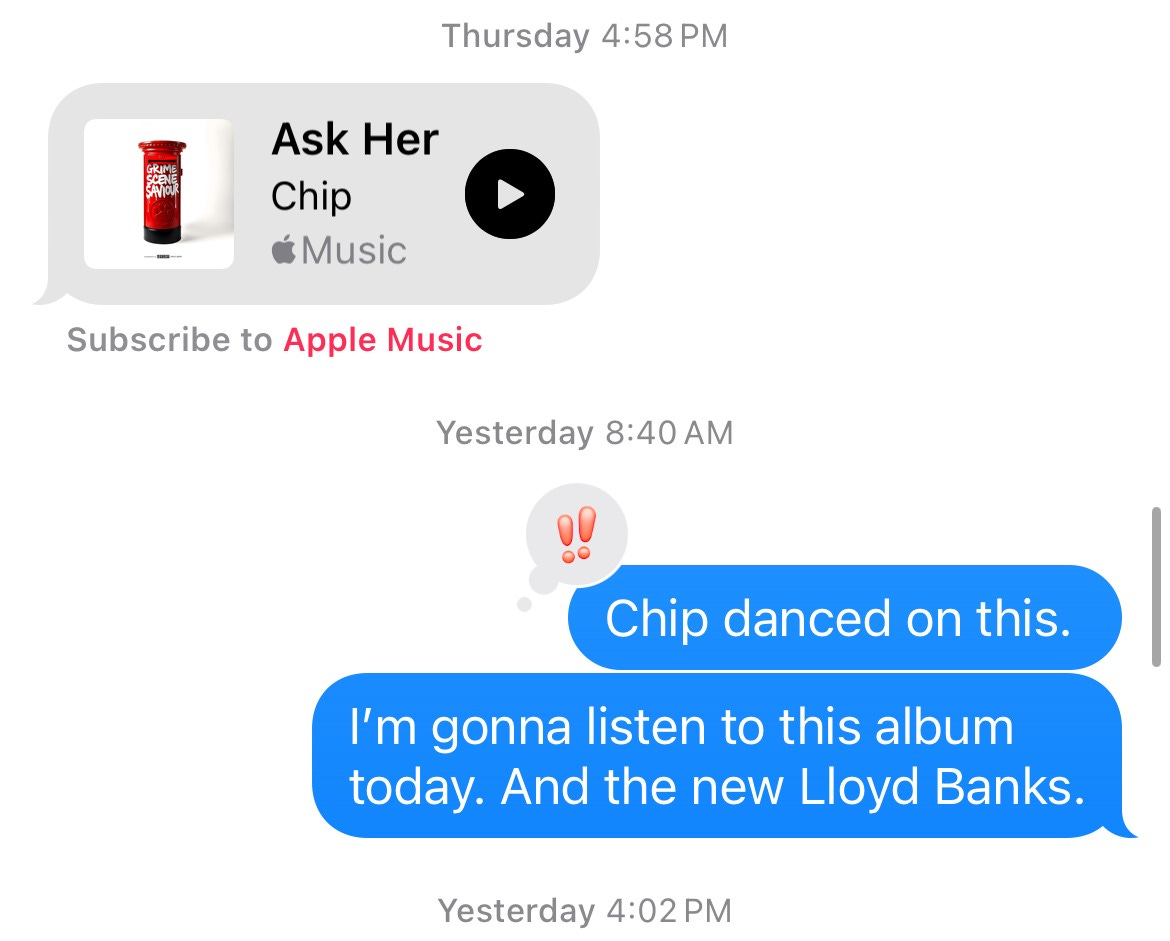
Where was I? LANGUAGE. My closest friend in London, let’s call her La Travelista for anonymity, who has Jamaican heritage, said something to me one day that made me ponder language and the diaspora. I think it may have been a fly-by comment to her, but one that stuck out to me like a sore thumb. She noted that my ability to speak patois well, as someone from New York, is impressive compared to someone from London who can do the same, since so much of Black British slang already has Jamaican patois embedded in it. It’s less of a hurdle, whereas New York slang is (admittedly) a different language altogether. Do you know how confused I was when I learned that jippin and brolic weren’t standard terms used by everyone, everywhere?! NY natives, brolic isn’t even a real word. I know, heartbroken – right?
But she was right. Because whenever I speak to a Jamaican from Atlanta (as an example), and they start with the talmbout-accent, and then dip into patois, I find that far more impressive than someone transitioning from London slang into patois. Makes sense?
London is England’s main character in the popular imagination, but there is a universe of language variations across the country.
To clarify – I’m only talking about English (the language). When you consider the headline above, it is rudely unremarkable since this is how every single place on this earth operates. It doesn’t take much brainpower to understand that people from North, South, East, and West (in the same country) will sound different. That city folks lads and rural folks lads sound different, and have different relationships with how language is used, is par for the course.
Ironically enough, my first personal run-in with the different languages across Britain happened in NYC. My friend and I, La Travelista, attended the Anthony Joshua vs. Andy Ruiz fight back in 2019 at Madison Square Garden. I remember hearing a British person say something I can only describe as un-make-out-able. I looked at my friend with sheer confusion, and she could not stop laughing. She informed me that what I just heard was a Scouse accent. I didn’t need to make any mental leaps after that…well, to understand, I did…but recognizing that there will be a variety in tongues depending on region is miserably simple for me to appreciate. Why? Because my family hails from St. Elizabeth, Jamaica (North and South), and non-St. Elizabeth Jamaicans always have playful jokes about how different people from St. Elizabeth speak.
 Tiktok failed to load.
Tiktok failed to load.Enable 3rd party cookies or use another browser
This is so disrespectful LOL, but I appreciate the humor.
I needed to know more about this Scouse accent. Liverpool (home of the accent) was already loosely familiar to me because of my stretch playing soccer/football from middle school through high school. But rap of the Liverpudlian variety was less familiar to me. Liverpudlians is crazy, I’ll use Scouse from here on.
Before we go there, some orientation.
#1 – Congrats, Liverpool, on winning the Premier League.
#2 – Location, location, location.
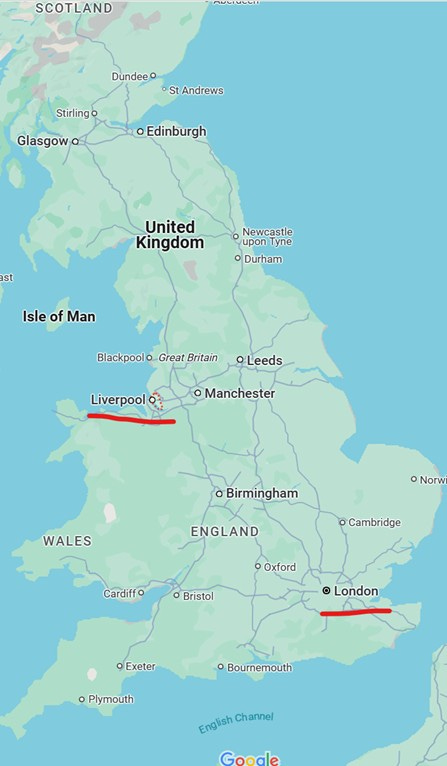
#3 – An example of a passionate and proud Scouser, Paddy Pimblett.
#4 – Compare Paddy’s (that’s a wild name to my NYC-brain) accent to Leon Edwards’s.
Guess what, though? He’s not from London. He’s from Birmingham (go back up to that map). Well, as you heard the man say, he was born in Kingston, Jamaica wit nuffink. Yes, I did all of this on purpose. Big up to Major Edwards!
#5 – The MUSIC!
I’d argue, from my U.S.-perspective, that the most popular song recently (in Scouse-land) is the following –
“beh-nuh”
Man, the accents are so interesting. Here’s another example. This time, Blackburn, UK, which is North of Liverpool and Manchester (yes, at this point – I’m just sharing some of my favorite chunes) –
This song is hard. I imagine these types of anthems make people shout loud when their neighborhood gets airtime in a function.
DJ: Is Blackburn in the building?! *Cues the song*
Robbed a bank in a Blackburn kit.
All the Blackburnians (UK folks, gotta find better names): *go crazy*
They actually react like
Jamaicansthis in the UK, I’m not trying to be funnyTugay Kerimoğlu is a Turkish baller who played for Blackburn
There’s a lot to unpack here, but remember – appreciation is driven by upbringing, exposure, and language
And on #3, here’s some comedy reels to drive the point home –
You see why comedy is a great medium? By the way, Mo Gilligan has Jamaican heritage =)
My friend, La Travelista, has confirmed that no one goes crazier than “man from South” (London) when neighborhoods get shouted out in a function. Reminder: I just talked about Blackburn, I know the comedy must’ve thrown you off topic. But yes, “South” packs a lot of main character energy, according to many Londoners.
She said Croydon lives over in Europe LOL…I told you it’s far!
London acting like the center will largely be unsurprising to the more cosmopolitan among us since Top Boy did a pretty good job with specific types of exposure to sides of London (and England-broadly) that most people don’t think about. But before this…
…many Americans, on average, thought British Hip Hop was basura.
Did you see how people in the U.S. first reacted when they heard Giggs on KMT? I remember, it was unsavory, to say the least. It was also very honest, raw and organic. Ultimately, it boiled down to a language, exposure, and understanding conundrum, manifesting in ‘turn that bulls*** off’ verbiage. I’ll hammer the point home with clips/videos and additional context.
Is it possible for something to be “not good” when there are this many people that it resonates with, jumping up and down and singing it at the top of their lungs? Well, yes because taste is subjective. Most things, artistically, can be classified as for you or not for you. This is my ‘try to be fair’ take on things. I absolutely listen to some music and think…this is hot garbage, my ears are bleeding. But I can also reason that I may not know what’s going on, it doesn’t resonate in the same way with me that it does someone else who is more bought into whatever the art’s context is. Trying hard here not to poo-poo on some of the music today.
Another thing. I can be fair in saying that the U.S. isn’t the final say on whether your “thing” is good or bad. I’m writing from NYC & Jamaican-diasporic contexts (largely speaking), so that’s why I keep reverting to my means. However, the historical grounding (origin) for why American input is omnipresent (i.e., certain music being at the judgment whim of American ears/voices) should at least be understood. Music transcends, but the biggest critics will usually be of the place where the music originates (e.g., Hip Hop)…and that’s perfectly normal.
But we can live in harmony –
There has been a recent, let’s call it, integration and appreciation phenomenon that has taken place, for some, in recent years. I’ll give Dave and Central Cee a chunk of this credit. Skepta purists, relax, I know you saw him over a decade ago in NY. Talking averages here.
Good song, I get it.
Ultimately, this granted previously uninitiated consumers with…exposure. As I’ve mentioned before, cross-cultural appreciation relies heavily on exposure. Things range from mundane to yea-I-get it when you have…exposure (generalizing). Moreover, humans are fickle followers (read: social creatures). They may poo-poo on something, but once it becomes trendy, the seal is broken and they tend to get on board, especially for that which commands a ton of limelight. I don’t necessarily consider this a bad thing. The behavior is evolutionarily predictable more than anything else. So, mix a little Top Boy with a little go-viral song, and suddenly, appreciation, driven by exposure and language, skyrockets.
Here’s a more personal, relevant example:
→ Albanians
→ Londoners know that you don’t mess with Albanians unless you want problems (generalizing my eagle-hand waving friends, take it easy)
→ People who grew up in and around the Pelham Parkway section of the Bronx know…do not mess with Albanians…because if you mess with one, all types of flying kicks and BMWs will come out of the woodworks (shout out to PS 89)
→ But guess what? Someone in, I don’t know, Crown Heights, Brooklyn may not make the same calculation because they’re not as familiar with Albanians
→ I will bet everything in my wallet that your typical American Southerner would say Alb-ah-what?
→ This is all based on exposure. You can’t know what you don’t know/haven’t been exposed to. It’s oddly simple.
I know that last section said “thought” the music was bad.
From a very regional point-of-view, I'd argue that many people still don’t understand that (British) language across the U.S.; Language as I’ve been defining it, at least. I’ll tease out Atlanta for a second because they’ve had a superb run in Hip Hop for a minute now.
Here’s Jo Koy making fun of Young Thug’s Lifestyle (and “Mumble Rap” broadly) –
But really what he’s saying is that he has no idea what Thug is saying (enunciating). And because Koy doesn’t know what Thug is saying, his natural conclusion is that Thug isn’t saying anything. Which, I understand where he’s coming from. But, and pardon my NY-ignorance, this doesn’t apply to Young Thug because he can actually rap (in the traditional sense).
To Southerners, but particularly ATL-iens, who understand every word he says in all his songs…it’s unexcitingly natural that they will take to his music more than others will. It all boils down to language.
Personally, when I became friends with a chunk of people from ATL (in college), they introduced me to a dance called Beef It Up. My first thought: naming a dance this would receive resounding and thunderous rounds of AYOs in NY. My second thought: this is crazy, what are they all doing in the circle? But then I quickly corrected that because I was king of the Crazy Hype circle. Okay, circles are good. My final thought (after enough exposure): I’m not mad at this, it’s cool. And that is just the natural progression of things. The unknown can grow on you. But more importantly, it takes sustained exposure and language references to fully grasp something.
It’s no surprise then…
…when you see certain music and artists go between America and London more seamlessly than others. This is notwithstanding that the British music consumer seems, stereotypically, to be more widely accepting of different genres of music/artists. I think that is largely a consequence of historical exposure and colonialism, evolving into a melting pot of appreciation for “others.” I use appreciation loosely and reserve that last bit mainly for the more cosmopolitan cities in Britain (e.g., London) where you have more different types of people in one area. Point is: You know more when you’ve seen more. You can speak and understand many different languages (not in the literal sense).
So, it was no surprise to me when Pop Smoke (RIP) made a natural progression from stateside fame to London fame. I called that out the gate. Why? Aside from the London drill <> NY drill connections (e.g., Pop Smoke utilized London producers, like 808 Melo, to create beats/songs), Pop Smoke is from Brooklyn and has Jamaican/Panamanian heritage. Ultimately, he spoke a language the British consumer would understand more readily. It helped that the music was good and trending (reminder: humans are fickle followers, they love what their fellow humans love).
Similar sentiments with Capella Grey, who is from my side of town – Uptown (Bronx) – and has Jamaican heritage. The difference between him and many other artists with similar heritage is that he infuses a lot of, what I can only describe as, Uptown-Bronx-Jamaican antics throughout his music. Before he dropped Gyalis, lack of exposure and understanding of that use of language would’ve made most Americans say…Gyal-what? But my fickle following fellow humans did the human thing:
→ Oh, this song is fire.
→ *everyone sings* Said I’m a gyalis…the city is my palace! LOL
It’s calm, as Londoners would say, that’s just how it goes. My point here is that if you don’t think Capella Grey will do well in London, more naturally than others, I’ve failed to convince you of how exposure, language, and cross-cultural appreciation works. So, I’ll provide another Exhibit to do the job –
One last thing, British folks, mostly London – I can’t fully trust you; you don’t have Haitians. I know you all like Fivio Foreign’s Big Drip, but when he said “figis, I’m giving nothing but figis,” you had no idea what he meant by that, right? Why? Because of exposure. You don’t have Haitians over there, so those words don’t resonate.
Note: Figis = face. Fivio Foreign isn’t of Haitian heritage, but he grew up around them in Brook-len.
But let me show you what happens – keep Fivio Foreign’s Big Drip in mind – when there’s cross-cultural exposure/reactions –
I like this song a lot. It’s also insane to say “this ain’t New York, nah this ain’t Chicago…this is the ends,” only to then later say that you made “eye the littiest line…eye eye eye,” which is just a flip of Fivio Foreign’s “aye, aye, aye.” You man are even dancing like NY drill rappers. I get so confused every time I listen to this song. But it’s fire, so we let the contradictions flourish. It’s really all appreciation when you break it down to its core. Sometimes, that appreciation is satirical, like this song (BK <> London) –
Honestly, my favorite British rapper is not from London.
He’s from Birmingham. I’ll re-paste the map below for ease of reference (right above where it says “England” in the center).
LOL. Depending on my countrymates to know “more than one city in England…” is not the hill to die on. Look at all of what we have to contend with –
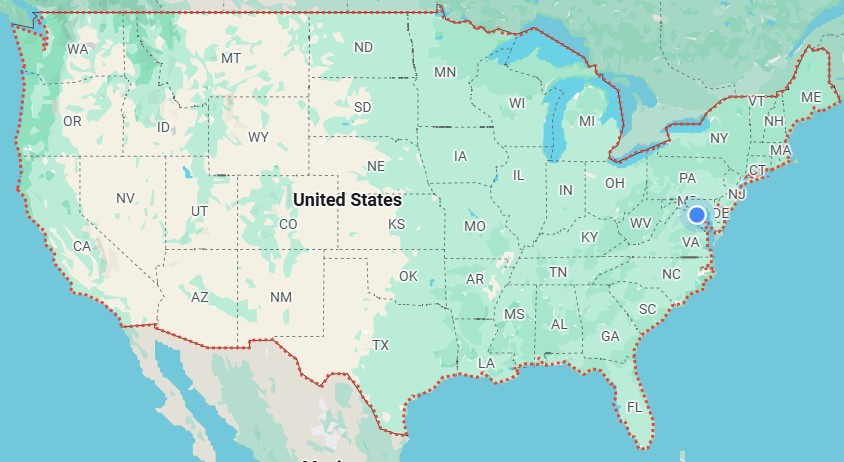
Do you think someone from, say, SD (South Dakota) will know about Birmingham? Come on, friends, let’s use logic when talking about these things. The average American, especially in the North and Midwest, could probably school others on Canadian cities (because of proximity). It takes, wait for it, exposure for these things to organically happen. Some numbers to make it make more sense: TX (Texas) alone has nearly half the population that the entire UK has. That’s one US state. One. We have fifty of them. See what I’m saying?
What I do appreciate, though, is that cross-cultural appreciation, largely through music/entertainment, is happening faster these days via digital technology and socials flattening the world (pros and cons). Where was I? Yes, my favorite artist right now.
*drumroll please*
And guess where else he’s from? You f***ing guessed it, lad.
If that wasn’t clear enough, then I can’t make it any more clear than this –
But as I reflected on my journey with British Hip Hop, I realized there was a common thread among the artists (listed below) that I took to:
Giggs (who I already mentioned)
Chip (also mentioned already)
WSTRN (mentioned already)
Teezandos (feels like I’m listening to my little, bad cousin)
Cristale (same, but less so)
There’s more to the list, but let’s stop there. All of the above have Jamaican heritage except the last four. Dave has Nigerian heritage. Fredo has Bajan and Moroccan heritage, which can only happen in London because what?! J Hus has Gambian heritage. And I could not find Aystar’s heritage, but I’m confident he doesn’t have Jamaican heritage. But the man can rap –
I think that’s why people like my music as well because it has that 90s style of rap that’s almost lost at this point. There’s only a few left, and we’re the last one’s left…I think it’s partly because each year is obviously a year further away from the 90s. For instance, all the kids going to school now, they’re listening to drill. That’s all they’re listening to. If you played them a tune from that era… let’s not say Biggie or Tupac because they’re the only one’s they do know… but if you played them a classic hip hop tune, say ‘Shook Ones’ from Mobb Deep or something they probably don’t even know who wrote that tune. – Never Wave Magazine.
My friend, La Travelista (reminder that she’s from London proper), also thinks so. She just can’t stand the Scouse accent.
And that’s the beauty of language, even in the same country. This London-Liverpool discrepancy can be compared to a NY-Baltimore (or anyone-Baltimore) discrepancy. However, Baltimore people don’t care because their city is tough/can defend their stripes. Moving on.
Got sidetracked. The point of this section is to say that just because I like British Hip Hop does not mean that a London artist is my favorite. Shout out to M1llionz.
I encourage you to explore across British genres, their Hip Hop and R&B/souls is not where it ends (obviously) –
One of my personal favorites is UK Garage, or UKG.

Assuming you’ll get back to that ~50-minute video when you can (the Source under the image above), here’s a magical snippet from a legendary Garage DJ set in the meantime.
DJ EZ, friends –
I’ve watched EZ’s full set an embarrassing number of times.
Garage is what happens when you can’t contain music genres and cross-cultural explosion outpaces your ability to do much of anything about it.
The evolution of house music in the United Kingdom in the early to mid-1990s led to the term, as previously coined by the Paradise Garage DJs, being applied to a new form of music known as speed garage. In the early 1990s, American DJ Todd Edwards, a pioneer of the speed garage sound, began remixing more soulful house records and incorporating more time-shifts and vocal samples than normal house records, whilst still living in the US. However, it was not until DJ EZ, the North London DJ, acquired one of Edwards' tracks and played it at a faster tempo in a nightclub in Greenwich in 1994 that the music genre really took off…though UKG remains a distinctly British sound, the influences of black diaspora and especially the Caribbean on its development should not be ignored. The concept of the MC, which is a central figure in UKG, originates from the Jamaican dancehall tradition of 'toasting' and its vibrant sound system culture. – Wikipedia
You see why Jamaicans are boastful?
Even more amazing is when the conversations (language exchange) inevitably become two-way streets.
Watching the video above – I clocked in at about 15x – gave me chills. Because I fully cover the triangle of upbringing, exposure, and language. For others, this will do absolutely nothing for you. Isn’t that amazing?
David Rodigan, the German-born-Englishman, is (and will be) cemented in Jamaican music history as one of the greatest DJs/sound-system jugglers…ever. When you have an hour to spare, if you want to hear, from Rodigan’s perspective, how his love affair with Jamaican music developed, here you go –
“This is genuine love for music.”
But this is also what genuinely happens when humans rub shoulders to explain it in an elementary way. Alright, a lot of music, let’s get into some comedy –
“Are you waiting whilst you’re parked or whilst you’re driving?”
LOL, Nigerians man.
“Mr. man in di back”
LOL
Beyond the jokes, the history of the people behind the music goes much deeper.
Obviously. But that is PhD level coverage that I won’t get into here. I also don't have a doctorate, to be clear. However, I would be remiss(ed) not to mention some of that very important history. Before I do, my fellow Americans, you got a crash course in the presence of Black people in Britain dating back many centuries via dandyism and the Met Gala last week. Since the Met Gala theme was heavy in the media runs this year, I’ve seen Monica L. Miller’s Slaves to Fashion: Black Dandyism and the Styling of Black Diasporic floating around on the socials. I highly recommend. Dove into it in 2023, great read. Dense, but great.
…once slaves to fashion — make fashion their slave.
…as many historians of black Britain note, black slave resident[s] in England from the time of their first landing in the 1550s through the eighteenth century, were often used and regarded as luxury items and ornaments rather than as laborers. They were therefore dandified, dressed in hyper-haute versions of the latest fashion.
…the black dandy — a widely resonance symbol of the history of the black community’s negotiation of aesthetics and politics…
I only provide the above to set the tone against recency bias. In other words, many people (probably American, to be fair) ascribe Black and Britain as something that is more recent history than centuries old. Now that that’s out the way, I will talk about recent (ish) history that is profoundly important to the conversation of the Black British identity (note: Caribbean bias).
The Windrush Generation:
Post-World War II, the British needed to rebuild its economy
The British invited primarily residents of its Caribbean colonial holdings to come to Britain, no strings attached
Many of those invited fought alongside Britain in the war
Documentation was not provided to formally establish citizenship for those invited
And many of those, now elderly British people of Caribbean heritage, and their children, were being deported given…lack of documentation
This is a crudely condensed version of the history, forgive me.
Some fascinating documentaries and books chronicle other Black migrants’ journeys to Britain, many of whom have the sentiment of respect for the Windrush generation given what they endured (hard life transition in England). The enduring helped make the road easier for many who came thereafter. This is analogous to the experience of Black immigrants (to America) juxtaposed to Black Americans who trace their heritage on American soil back many centuries (i.e., made the road easier for those who immigrated to America later).
Here's a trailer from an incredibly well done film highlighting the Jamaican Windrush generation, the advent and proliferation of Lover’s Rock music, etc. (watch this episode when you get a chance!) –
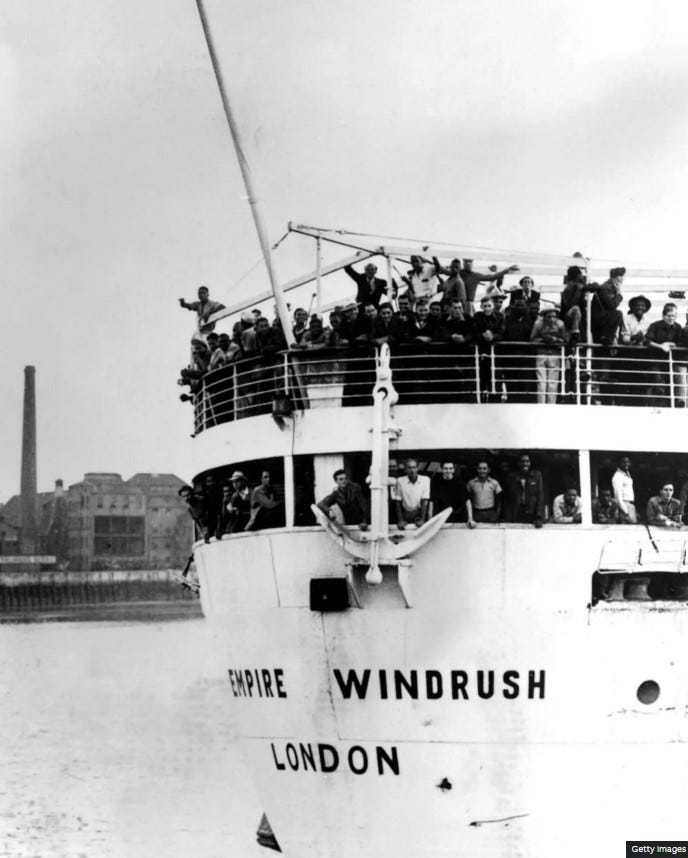
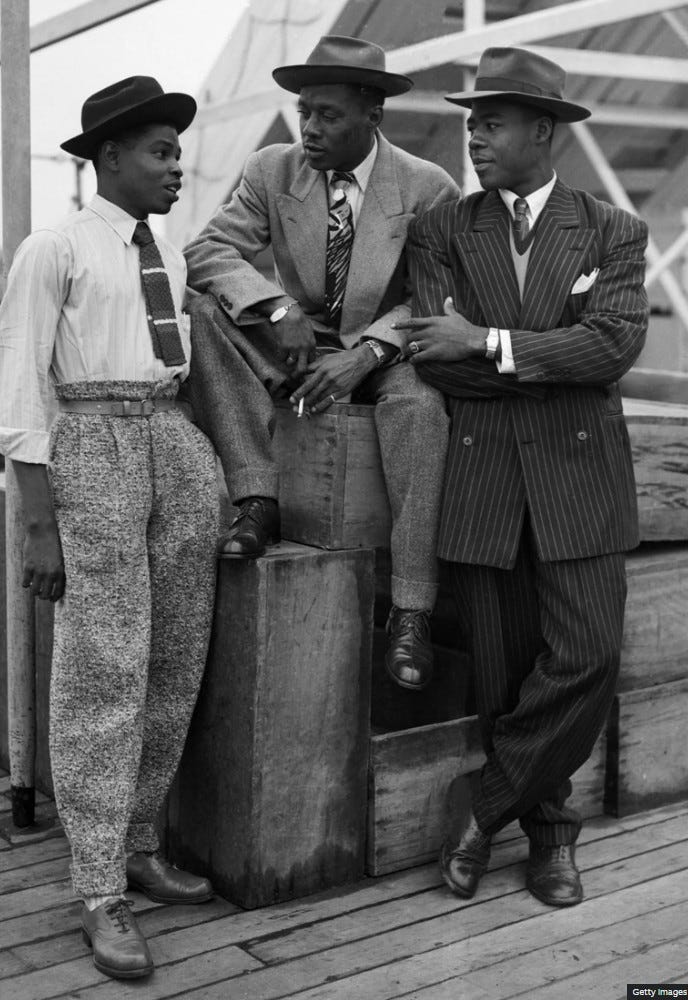
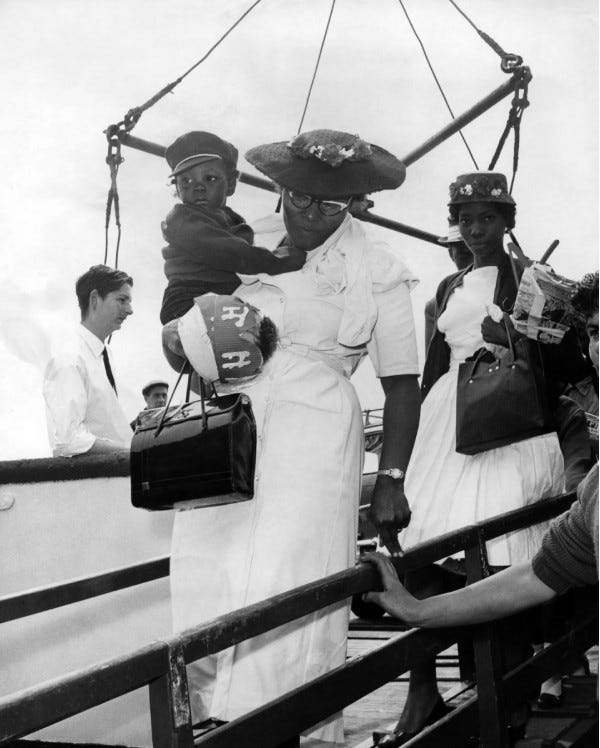
A little heavy? YOU’RE SOFT Let’s close out on a lighter note.
I admit, most of the chunes I shared throughout the piece lean heavy/rough. We’ll wrap with an amazing collaboration between Jorja Smith (British) and Lila Iké (Jamaican) –
Guess what? Jorja Smith’s dad is Jamaican. So, we’re really ending with Jamaica!
Appendix: Good Music
Note: This list can carry on forever, so I’m providing a slightly extensive sample set of chunes to listen to at your leisure. Explore the depth that I’m sure I’ve only scratched the surface of. Enjoy!
No skips!
Another one. No skips!
Magical performance
DJ Wookie x UKG set that I really enjoy
Here’s another interesting article on the rise and decline-in-popularity of UK Garage (if interested): https://www.masterclass.com/articles/uk-garage-music-guide


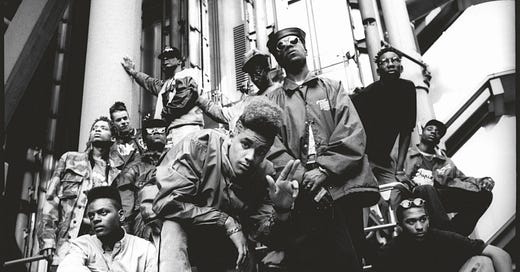



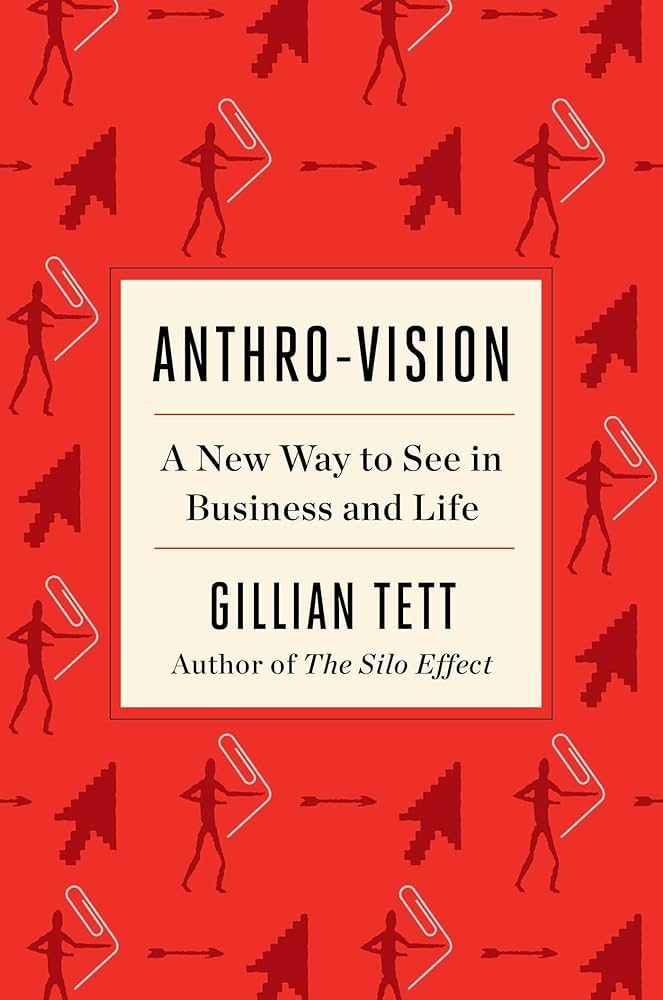

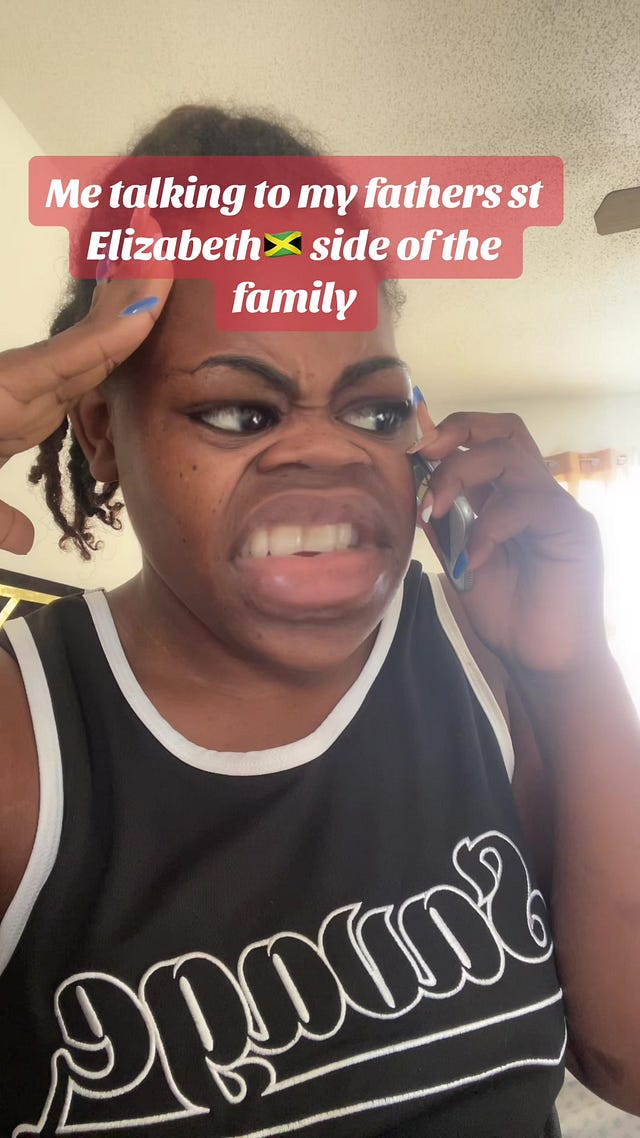
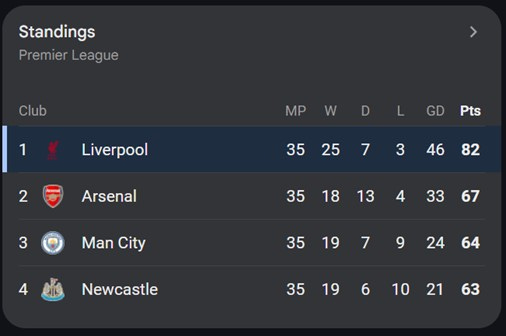


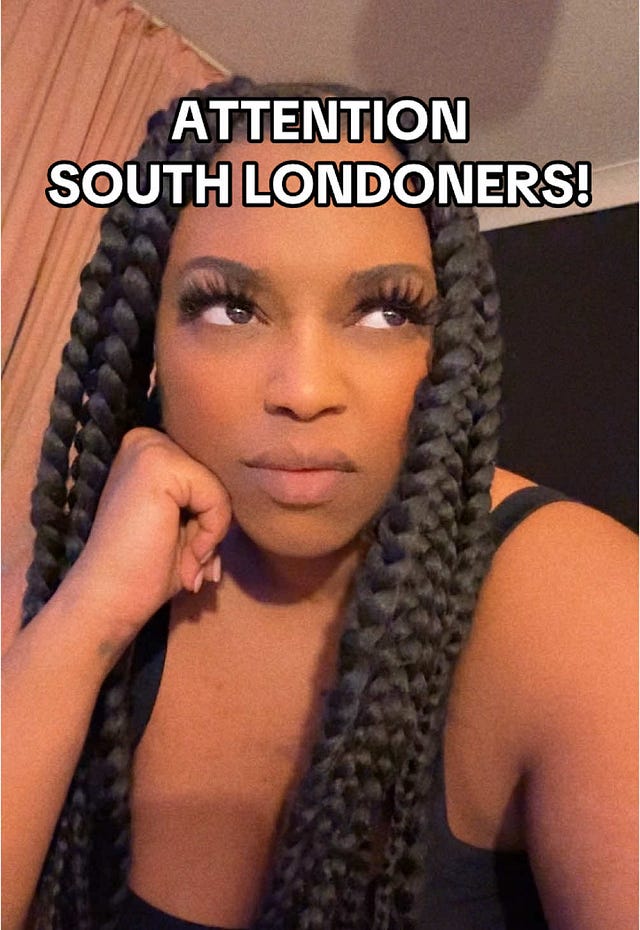


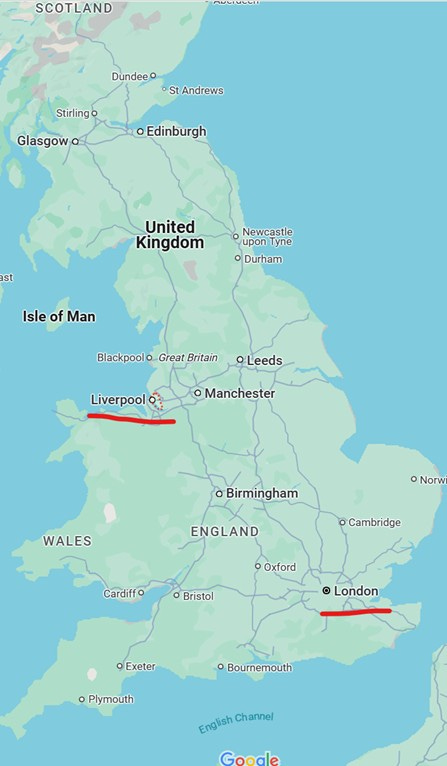


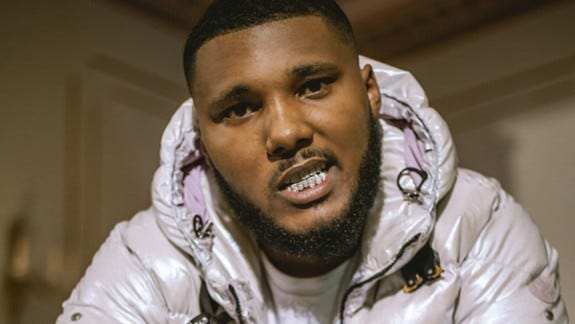
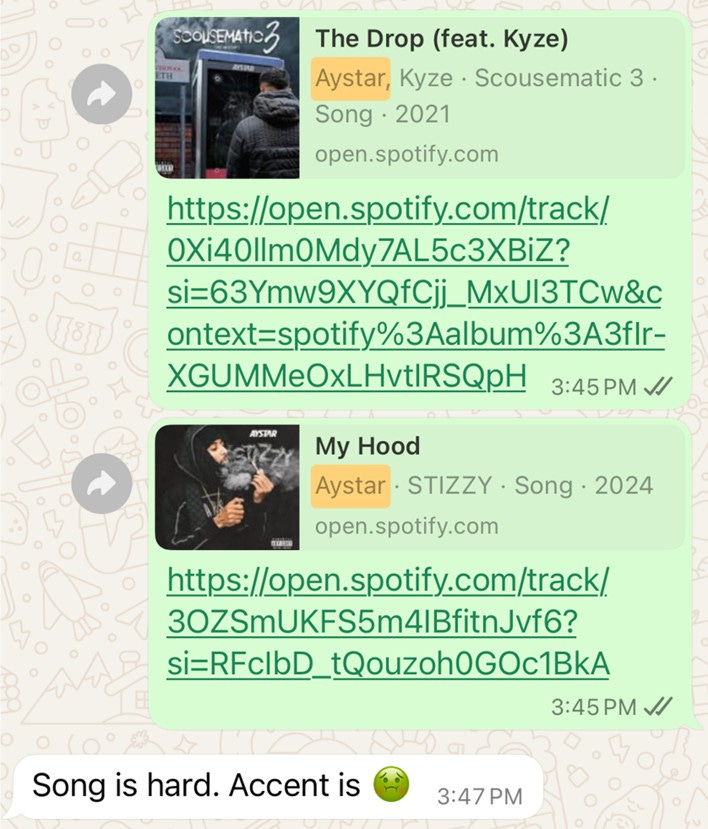
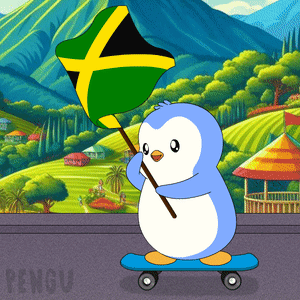
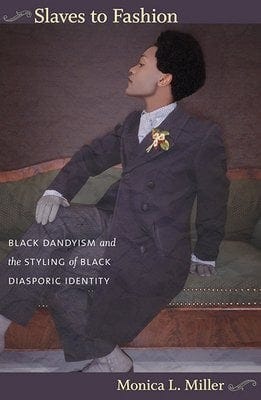

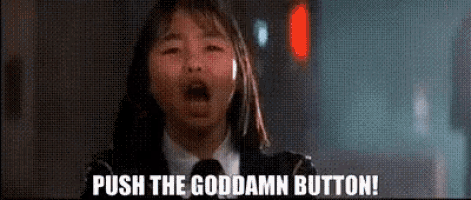
Prior to reading this, I was among the Americans who considered British hip hop to be “basura.” Definitely enjoyed this piece and being put on to some great music.